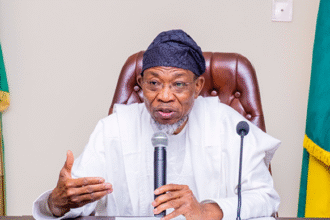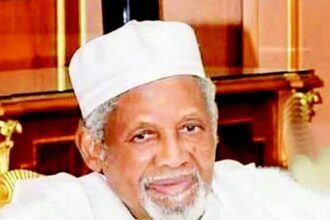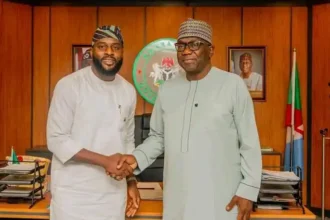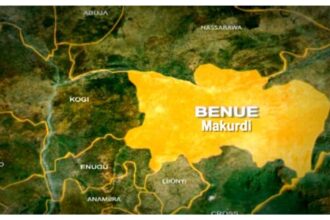...To get all news updates, Join our WhatsApp Group (Click Here)
Also Join our WhatsApp Channel (Click Here)
Acting chairman of the Economic and Financial Crimes Commission Mr Ibrahim Magu who was rejected by the Senate, for the second time, as substantive chairman responding to the query orderd by President Muhammadu Buhari through the Attorney-general of the Federation and Justice Minister, Abubakar Malami on the DSS allegations has said that it is true that some documents relating to cases under investigation were found his house when his residence was searched on the orders of Mrs. Farida Waziri, shortly after she succeeded Mallam Nuhu Ribadu as Chairman . As reported by Premium Times Magu gave a point-by-point rebuttal of the allegations.
Read Magu’s full response below
“I most respectfully refer to your letter referenced HAGF/EFCC/2016/Vol.1/23 dated 19th December, 2016, asking me to respond within 48 hours to the allegations contained in a report written by the Department of State Service, DSS, and which provided the basis for the non-consideration of my confirmation on December 15, 2016, by the Senate. 2. Having carefully considered all the issues, I hereby present a point-by-point response as follows: i. Missing EFCC Files It is true that my residence was searched on the orders of Mrs. Farida Waziri, shortly after she succeeded Mallam Nuhu Ribadu as Chairman of the EFCC and some documents relating to cases under investigation were found in my house. At the time of the raid, I was yet to formally hand over to my successor, Umar Sanda, as head of the Economic Governance Unit. My schedule at the time warranted that I work round the clock and it was impossible to conclude all assignments without working at home. The documents found in my house were actually found in my office bag where I kept documents relating to investigations. I was in the process of handing over and it would be wrong to suggest that I willfully kept the Commission’s files at home. Nevertheless, the incident was thoroughly investigated by the police as I was placed on suspension without pay for 20 months. But in the end, I was reprimanded, recalled and promoted to Assistant Commissioner of Police. It is important sir, to draw your attention to the fact that some of us that worked closely with Ribadu were victimized after his exit. And my ordeal was orchestrated as punishment for being the chief investigative officer for most of the high profile cases involving politically exposed persons some of whom became very influential in government at the time. ii. Return to EFCC under Lamorde I was Assistant Commissioner of Police in Charge of Operations at the Anambra State Police Command when I was recalled to the EFCC in 2012. I did not lobby to return to the EFCC. It is preposterous for anyone to suggest that I was recalled to do a hatchet job for Lamorde as alleged in the DSS Report. My job schedule as Deputy Director, Department of Internal Affairs, under Lamorde, was simply handling issues of professional responsibility in the Commission. I had no inputs in core operations duties of the Commission. iii. Tenancy of My Official Residence I live in the official residence of the Chairman of the Economic and Financial Crimes Commission (EFCC). This accommodation, contrary to the report of the DSS is not my private home, neither was it rented and furnished for me by Commodore Umar Mohammed (rtd). It was rented and furnished by the Ministry of the Federal Capital Territory through the Abuja Metropolitan Management Council, under the safe house scheme. It is also false that the house was rented for N20million per annum and furnished for N43million. The entire cost for both two-year rent and the furnishing of the house is N39.628million. Details of the transaction are contained in the contract award letter and payment schedule which are attached to this letter. iv. Expensive Air Travels Honourable Minister, the claim that I have a penchant for expensive air travels in a private jet belonging to Commodore Mohammed is baseless The two times I can recall travelling in Commodore Umar’s aircraft, were on a trip from Kano to Abuja, and Abuja to Maiduguri. In the first instance, I had gone to Kano on an official assignment with two of my directors, and Mohammed who was on his way back to Abuja offered us a ride in his jet. The second occasion was when I was going to see my sick mother in Maiduguri. These, for me, were harmless gesture as we were both members of the presidential investigative committee on arms procurement. At the time I had no knowledge that he was under investigation for any alleged crimes. Claims that I flew in Mohammed’s jet to Maiduguri in company of the Managing Director of Fidelity Bank, Nnamdi Okonkwo is false. I have never flown in a private aircraft with any managing director of any bank let alone one that was under investigation by my agency. I have no personal relationship whatsoever with him. v. High Profile/Dual Lifestyle The allegation that I live a flamboyant lifestyle is also surprising to me. While it is true that I did travel first class on Emirates Airline to Saudi Arabia for Umrah, this action to the best of my knowledge, did not contravene the directive of Mr. President on First Class travels as suggested by the DSS Report. My trip to Saudi Arabia was a private journey to perform my religious obligation and it was not financed with public funds. More importantly, my decision to fly first class was not borne out of quest for luxury but compelled by necessity. The trip was made during the last ten days of the Ramadan and other classes of ticket were not availbale.I had no other choice. That I flew first class in one instance is not enough evidence to suggest an extravagant lifestyle as alleged by the DSS Report. It is also not enough to suggest a dual personality. Any one that has associated closely with me will attest to the fact that I am not known for ostentatious living. And my new office as acting chairman of the EFCC has not changed this. vi. Mutually Beneficial Relationship with Commodore Mohammed Umar (rtd) Sir, it is important to situate my relationship with Commodore Mohammed Umar (rtd), in proper perspective. Our paths crossed when we became members of the Presidential Committee on the investigation on arms procurement. He was instrumental in getting some of the information that helped the committee to make significant breakthrough in its assignment. Beyond that, the relationship between Umar and myself is one of professional acquaintance, devoid of issues of conflict of interest. So, it comes to me with shock, the imputation by the DSS that we have a “mutually beneficial relationship”. This appears suggestive that Mohammed and I were involved in activities that could be said to be untoward. I certainly have no knowledge of such activities. The claim that EFCC documents, including EFCC letters addressed to the Vice President and being investigation reports on the activities of Emmanuel Kachikwu and his brother Demebi Kachikwu, were found in his home during a search by the DSS came to me as a surprise. If that is correct, he should be made to disclose how he came by such documents. I never discussed my official duties with him let alone give him documents pertaining to investigations being conducted by the Commission. Interestingly, Mohammed was detained for several months by the DSS. In all those months, did he claim that I mandated him to commit any crime or that I was an accomplice to any crime? If there is any such claim, I will wholeheartedly like to be confronted with the allegation. It is interesting to note that when Mohammed was eventually charged to court, the charges against him were money laundering and illegal possession of firearms, and nothing related to my purported “shady” relationship with him. vii. Perceived Reluctance to Arraign Vice Marshall Adesola Amosun The DSS Report that the reason EFCC delayed the arraignment of a former Chief of Air Staff, Air Vice Marshall Adesola Amosun, was because Mohammed never wanted Amosun to be prosecuted is astonishing. Anyone familiar with the EFCC under my watch knows that I perform my duties with the highest sense of responsibility. The reason Amosun was not arraigned when the likes of Alex Badeh and Umar were arraigned was because he cooperated with the Commission in terms of assisting the process of recovering the proceeds of crime. Indeed, among the suspects arrested over the arms procurement scandal, he was most cooperative. The Commission recovered N2.835billion cash from him, aside from property worth One Billion Five Hundred and Eighty One Million Naira (N1,581, 000, 000), Two Million One Hundred and Fifty Thousand United States Dollars ($2,150, 000) and One Million Pounds Sterling (£1, 000, 000). Since a key focus of the investigation was to recover as much proceeds of crime as possible, the Commission took its time to ensure it had recovered what was possible before arraigning the suspect in court. This had nothing to do with the wish of any individual. Moreover, the suspect has since been arraigned before a court of competent jurisdiction. viii. Alleged Vendetta Against Stanley Lawson The suggestion by the DSS Report that Stanley Lawson, a former Group Executive Director of the Nigerian National Petroleum Corporation (NNPC) was placed on a watch list, to settle scores with him is strange. It may interest you to know that I do not know Stanley Lawson personally and could not be settling personal scores by framing somebody that I do not know. Lawson’s encounter with the EFCC is in relation to the investigation into the mismanagement of $118million public funds for electioneering campaign involving former petroleum resources minister, Diezani Alison Madueke. It was discovered that he made payment of $25million into Fidelity Bank and also facilitated the purchase of Ogeyi Place Le Meridien Hotel in Port Harcourt for Mrs. Alison Madueke, for which he collected Ninety Four Million Five Hundred and Sixteen Thousand Naira (N94, 516,000) as commission. Lawson was arrested and he made a refund of the N94.5million traced to him. He was never placed on any watch list. ix. Work through Police Cronies in EFCC I do not understand what the report meant by working with cronies. If what was implied is that I have preferred officers that I work with and who go about their work in unethical manner, my response is that nothing of such exists in the EFCC. Officers who work with me know that the easiest way to lose your job is to be found to be involved in unethical or corrupt activities. Indeed, when I assumed office as acting chairman, my first action was to return police officers with integrity issues back to the Nigeria Police Force. If the DSS finds that there are police officers in the EFCC who are working closely with me and have properties that their incomes cannot support, the Service is at liberty to expose them. 3. Conclusion Honourable Minister, Sir, I invite you to take notice of the fact that the DSS authored two separate vetting reports on me, one referenced SV.114/3 addressed to the Clerk of the National Assembly and the other referenced SV.114/3 addressed to the Senior Special Assistant to the President on National Assembly Matters (Senate). Both letters were dated 3rd October, 2016, and signed by the same Officer, Folashade Bello, on behalf of the Director General. While one of the reports advised the senate against my confirmation, the other asked it to favourably consider my confirmation. The two reports emanating from the same agency raises questions of sincerity and motive. You will want to find out why they came up with two conflicting reports on the same subject on the same day. It is important to note that in all this, I was not given the opportunity of fair hearing. Above all sir, I am persuaded by my conviction in my innocence that in all the issues supposedly raised against me, no one has accused me of receiving gratification to act against my conscience or the interest of the country. I have attached to this letter all supporting documents and materials that would enable you arrive at fair position on all the issues raised. 4. Be assured of my usual respect and highest consideration.
IBRAHIM MAGU Ag. EXECUTIVE CHAIRMAN
You can get every of our news as soon as they drop on WhatsApp ...To get all news updates, Join our WhatsApp Group (Click Here)
Also Join our WhatsApp Channel (Click Here)









